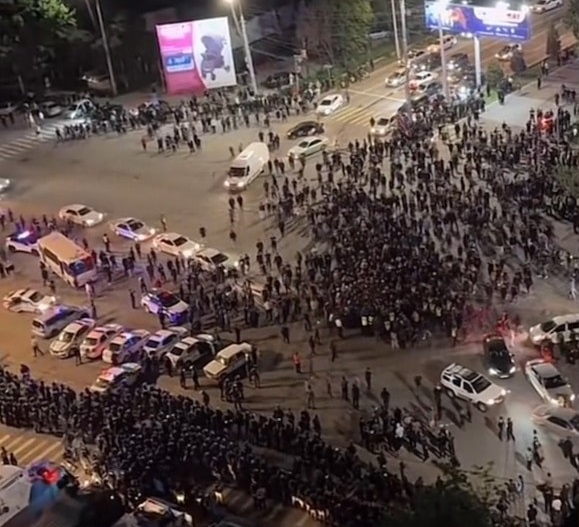Bishkek, racism against Pakistanis and the absence of a civil society
After the clashes of the past few days many students are leaving the Kyrgyz capital to return home, with a series of charter flights organised directly from Islamabad. The rector of the diplomatic academy, Kurmanov, is harshly critical: ‘We risk becoming a rogue country, where everything is shared out among the local clans’.
Bishkek (AsiaNews) - The recent night of mob madness in Bishkek, with clashes in the streets between locals and foreign immigrants, has left a heavy atmosphere of inability to welcome and absence of a real ‘civil society’ in Kyrgyzstan. Many students from Pakistan are leaving the Kyrgyz capital to return home, with a series of charter flights organised directly from Islamabad. The consequences of these dramatic events may be very difficult for Kyrgyz society and its relations with its neighbours, as the rector of the diplomatic academy of the Kyrgyz Ministry of Foreign Affairs Zajnidin Kurmanov comments on Azattyk.
In his opinion, ‘we are in danger of becoming a rogue country, incapable of welcoming foreigners and with a government without authority, made up of uncivilised people who are not worth investing in and where no tourists come, people of inferior rank in the international arena, and this has never happened to the Kyrgyz’. The outbreak of intolerance threatens to completely undermine Kyrgyzstan's image, ‘demonstrating a general failure in education and civil formation’, and reforms are urgently needed ‘not partial or half-hearted, but carried through to the end’. The reforms must not only be political and economic, but deeply social, dealing with culture and education, because ‘the state is a very complex institution, a mechanism with very different factors’.
The risk, according to the dean of diplomats, is to ‘get caught up in the eagerness for economic and market reforms, forgetting everything else’. The current conflict creates great tension with Pakistan, a regional superpower with nuclear potential, a country of 300 million people compared to Kyrgyzstan's little more than 7. The Pakistanis who come to study in Bishkek are mostly from the less affluent sections of the population, and they generally behave very quietly and reservedly, traditionally being anything but turbulent people, whereas ‘we behave like racists’, Kurmanov complains, noting that ‘even the police stood by and watched while our people created problems not only for foreigners, but also for our own citizens’.
The foreigners involved in the riots were repatriated, while the Kyrgyz who went unpunished. The foreign executive calls for an awareness of the drift of social behaviour in Kyrgyzstan, where, for example, there is a serious increase in domestic violence while ‘everyone is silent, including ministers of religion, deputies and the police, the sporadic interventions of the security chief Kamčybek Tashiev are not enough’. Kurmanov recalls that ‘I am a history teacher and I often write about our great history, how we are a people of ancient and noble traditions, but only as long as we lived in villages and tried to build our civilisation’.
Today, however, ‘we are administered by cold bureaucrats, the oligarchs have even divided up the seats in parliament and change the laws to prevent anyone other than them from gaining access to positions of power, without any protests even in the press’. According to Kurmanov, speaking ‘as a political scientist’, the transformation ‘of democracy into oligarchy’ is underway, and Kyrgyzstan risks being reduced to ‘a political prison’. It is dominated by what is called the kirghizčylyk, a partition of local clans that imposes the difference between superior and inferior in social life where the institutions that regulate the lives of citizens, both political and law enforcement, do not function, ‘everything is in the hands of the corrupt and bandits’.
Kurmanov also recalls that this year marks the centenary of some of the fathers of the Kyrgyz homeland such as Abdykerim Sydykov, Imanaly Ajdarbekov and others who gave their lives for the country at the time of the revolutions, when the Bolsheviks had no intention of identifying the Kyrgyz republic within the Soviet Union, dividing it among the other Central Asian territories. Today the Kyrgyz state exists, the historian concludes, ‘but we lack civilisation, we are 7 million people, but we are not real citizens and we are degrading more and more, we must regain a sense of responsibility towards our land’.
12/02/2016 15:14







.png)










